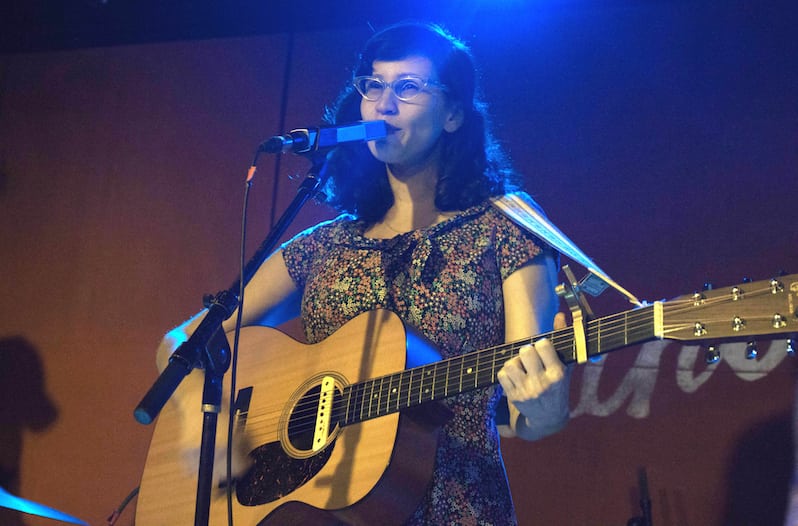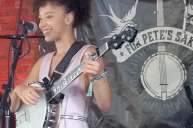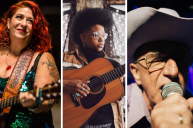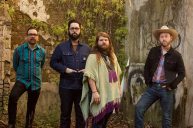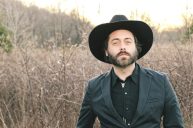The thing that'll strike you most when you enter Branded Saloon will probably be the door handles shaped like steers' horns, set rather improbably on the corner of a quiet business district in Brooklyn. Once you go inside, you'll notice the wooden booths and the ever-present country music on repeat in the background. Walk past the kitchen, you'll find a small back room with a vintage piano and stained glass window. Go downstairs, you'll spot a well-loved pool table. While the bar is meant to conjure up a specific place, it doesn't feel kitschy or mocking of the Southwestern setting it's meant to evoke. This is a place that's been lovingly constructed as a meeting spot for all kinds of people: the rainbow flag in the entrance way ensures that.
Videos by Wide Open Country
Branded Saloon is not a gay bar per se -- like many of its contemporaries in Brooklyn like C'Mon Everybody and Friends and Lovers, it bills itself as a "queer-friendly bar." Though gay bars in Manhattan still draw plenty of crowds, there are only three lesbian bars left in all five boroughs. Nobody knows why this is happening, but the pivot towards bars that host drag shows, queer dance parties, and Drag Race watch parties without explicitly coding themselves as gay has as much to do with inclusivity as it does the pragmatics of owning a small business.
Like Branded, my own path to country and Americana music feels out of place in New York City. There's a specific image of the typical country music fan -- white, Christian, probably rural, definitely not a city dweller, likely politically conservative, salt-of-the-earth, and almost certainly straight. By contrast, my high school sends a half dozen students a year to Yale and Harvard each. I sat next to Mark Zuckerberg's sister in English (a fact that became more interesting in my senior year, when Facebook extended its user base to private high schools to allow college students to creep on incoming first-year students.) At the time, we were more excited about P. Diddy's son entering the sixth grade.
It was not the type of place I wanted to fit into, in spite of my own breeding. As I smoldered my way through high school, waiting for college's sweet release (whether or not I'd be able to go was never a question for me), I fell deep into an alt-country rabbit hole thanks to my unabashed love for John Mellencamp, Cowboy Mouth, and the advent of Pandora. For me, alt-country felt like a compromise between my teen angst and an unbearably heavy sadness I carried with me throughout high school.
Once singing along with songs pining for women became my lived reality instead, I finally understood the source of that sadness. It turned into white-hot anger at a society that refused to recognize my legal equality. I turned to bands that kept the twang alive but stoked my existential rage: Two Cow Garage, I Can Lick Any Son of a B-tch in the House, Tim Barry, John Moreland. While I wasn't struggling financially or trying to claw my way out of a dead-end town, I identified with the sense that the world had put roadblocks in front of people like me, and that I'd figure out a way to get around them or die trying. However, I also felt there wasn't room for me in a music scene dominated by angry straight white men. I assumed that as a fan of this music, I wouldn't hear voices like mine. My queer identity would always make me an outsider among the scene I loved most.
Once I returned to New York, a friend of mine suggested I head out to a show called Queer Country Monthly. I shouldn't have been surprised but I couldn't quite believe what I was seeing -- right in the heart of my hometown was the very thing I had been searching for the most. When I got to Branded, I was bemused by the door handles but cowed by the time we had worked our way to the front row of the small back room. Branded Saloon didn't feel like another bar.
It felt like home.
A Scene Grows in Brooklyn
As magical as the space feels, the Queer Country concert series came from quite a bit of elbow grease. Karen Pittelman, the lead singer-songwriter of Karen and the Sorrows, created the series out of a sense of need. Pittelman is also a New York City native and, by coincidence, attended the same high school I did. (We're a few years apart.) Pittelman's route into country music was paved by her parents: her father started a company called Heartland Music that sold compilation albums of classic country artists (such as Country Gold) and her mother is a "passionate listener" of artists like Rosanne Cash.
The Sorrows' most recent album, last summer's The Narrow Place, tackled Pittelman's relationships to both her Jewish and white identities. For Pittelman, these struggles are a product of her upbringing in a world that felt deeply wrong: a society that claimed to value hard work and success, yet she and her peers had done little to earn the privilege handed to them. "Country music is a vehicle to tell the truth about your life. That's what I love about it." During her time in college, Pittelman expanded her political horizons and began to work for the non-profit group Resource Generation, which organizes young people with class privilege to move more money to social justice causes. She brought those skills with her into her musical life.
It all came together in 2011. After Pittelman left her punk band Royal Pink, she found herself returning to the country music she had written since she was young. However, something was missing. As Pittelman puts it, she planned the series to make space for herself: "I missed playing in queer spaces [with Royal Pink.]" She also felt uncomfortable playing bars with predominantly straight audiences because of the unwanted attention of a certain type of man. "I wanted that space to exist for myself." Pittelman credits that drive to the lessons she learned from punk and queercore. "You have to do it yourself, which is sometimes a pain in the ass," she chuckles. "I just couldn't stop. I needed it; I really wanted it to exist. It's not that I necessarily wanted to be the one who had to do it, but I just couldn't stop myself from doing it."
The idea crystallized soon after catching a show with that featured artists who would become early fixtures of the Queer Country Monthly series. Now-former Sorrow Elana Redfield's band The Low and the Lonesome, Humble Tripe, and My Gay Banjo -- all bands that feature queer members and themes -- shared the stage and Pittelman realized there was a special energy in the moment.
Soon Pittelman would capture that lightning in a bottle. Pittelman co-organized the first show, billed the Gay Ole Opry, with Mamone of Riot Grrrl, Ink and Queer Appalachia in the spring of 2011.The concert generated an overwhelming response. "I remember feeling really happy. It was very stressful, but I remember feeling a deeper joy connecting to everyone because I was also worried that people were going to come ironically. But they came with their true hearts on their sleeves. That felt like the place I'd been longing to play." Pittleman recalls seeing people cry in the audience. She knew that this couldn't be a one-time deal. Soon the Gay Ole Opry transformed into the Queer Country Monthly series, finding a home at Branded Saloon.
As healing as the space has been for concertgoers, it has also become an important space for musicians. James Wilson of the Paisley Fields recalls how it felt to play his first show at Queer Country Monthly. "It was exciting to find a supportive community." Wilson learned of the show through a queer singer songwriter concert he performed in at the Rock Bar. He had been referred to Pittleman by Wiley Gaby of Goldenchild. The difference between performing at queer shows and those that are not labeled as such, Wilson notes, is that it feels less isolating to perform among other queer artists. According to Wilson, Pittleman has helped create a network of queer country musicians.
That network spreads well beyond the I-95 corridor. The award-winning Appalachian instrumentalist Sam Gleaves has made a name for himself in the bluegrass world. Best known for his ballad about a gay coal miner, "Ain't We Brothers," Gleaves incorporates original songs about the queer experience in Appalachia with traditional songs of struggle in his sets. A few summers ago, he and musical partner Tyler Hughes made it up to Brooklyn to join Karen and the Sorrows. "Getting to play for the Queer Country Quarterly was a really proud moment for us. It's a rare space where you can actually sing as many queer songs as you want. You don't have to space them out in your set or spoon feed anything to anybody. We didn't have to sugarcoat anything. We knew the audience was right there with us." That concert has resulted in some creative opportunities: Gleaves and Wilson have co-written and co-recorded several songs.
Eli Conley, a folk singer based in Oakland, enjoyed his time at Queer Country Monthly so much, he has sister series in the Bay Area. "I was not expecting quite the level of resonance and warmth. It just felt like I could be all of myself -- especially after being on tour in North Carolina and Virginia, where I'm from. Places that feel like home in a certain way, but also didn't necessarily feel like if I was out fully as my true, queer, radical self, that that would be welcomed." For Conley, the concert was also memorable for an audience that was receptive to country music. "It felt like so many parts of myself coming together for the first time on stage."
Conley notes that queer audiences can feel alienated by country music. "If you haven't really experienced or listened to country music that's not just what's on the radio, you might have this stereotype that everybody who listens to country music is a Republican who hates your guts. And so why would you take a chance on listening to this music? ... Just because the bill you've been sold about country music is that it's only for people with Confederate flags. [But] we can actually reclaim this music and make it reflect our lives." Conley now hosts two to four Queer Country West Coast shows a year.
While the Queer Country series (now offered quarterly) has empowered other musicians, Pittleman knows there are further boundaries to push up against. "We can always get better. We always have to learn about accessibility. There's a lot to think about when you're centering music that is made more by white people than anybody else. I want to be thinking about anti-racism and creating space for performers who are people of color but not doing that in a way that's tokenizing. We're making a kind of music that's being asked to stand in for these political values that go against everything I believe in. I want to be thinking together with other musicians about how we can be creating spaces and creating music that challenges the status quo and reflects our own values."
Come Out, Come Out To Lavender Country
The Queer Country concert series has done a lot to energize young queer musicians, but they're hardly the first to stake a place for queer people among country music. Patrick Haggerty, who performs as Lavender Country, is still swagger and spitfire at 73. We're sitting in Branded Saloon, around the corner from the rehearsal space Haggerty, Wilson, and the rest of Haggerty's band have just wrapped their dress rehearsal. I ask him why, in 1973, he chose to record an explicitly queer country album, the self-titled Lavender Country. "I was raised on a dairy farm a hundred miles and two ferry rides out of Seattle in a pretty rural, isolated redneck place. I grew up on country music. People have asked me why did I choose it? I can give all kinds of sophisticated answers. But the real answer is: it's the only fucking thing I know how to do." We pause to order drinks. "I don't have any formal music training. I have music going on in my head all the time and a knack for writing lyrics, but I'm no kind of music technician."
The album has since been archived in the Country Music Hall of Fame as the first known explicitly queer country music recording. However, with songs like "Cryin' These Cocksucking Tears" (which cost a Seattle DJ her job when she played it on the air), "Back in the Closet Again," and "Straight White Patterns" (a sharp critique of sexism and racism in "conventional" middle-class families), it's not a surprise that the album was broadly shunned. "We weren't stupid when we made Lavender Country. We knew it was going to define us outside of the Pale. We knew there was going to be no market, we knew it was going to be all on us and that's the way it was. That was sad at the time, but it turned out to be the backbone of Lavender Country because what it meant was we weren't trying to water ourselves down so we'd be acceptable to any corporate entity. It allowed us free rein to say what we had to say."
Lavender Country now has a second life. To hear Haggerty tell it, someone found "Cocksucking Tears" on YouTube. The song -- and a copy of the album purchased on eBay -- made its way to the label Paradise of Bachelors. The North Carolina-based label reissued the album on 2014 and Haggerty's been touring in support of it since. However, even as Haggerty blazed a trail -- albeit one that became overgrown -- queer artists still find some resistance to their music.
Carving Out a Space
"Who makes the music and who has the resources to get the music out there and who gets paid for the music?" Pittleman asks. All of the musicians I spoke to for this article pointed to the stereotype of a country music fan as a huge roadblock -- not only to their work as musicians, but to the genre as a whole. "There are a lot of particularly white cultural anxieties that are going on right now that country music is speaking to." Country music, Pittleman notes, has a long history of racializing itself as explicitly white. "The connection between marketing and that image and white supremacy and politics is all mixed in. It's not really the music that creates that [stereotype] -- it's the way that music is being marketed. And the fact that that kind of whiteness sells, that there's a lot of white people who want that, and that that's what the marketers of this music have known ever since the division of 'race music' and 'hillbilly music' [in the 1930s.] Why do that? You're doing that because you know that's a good way to sell things to white people." In other words, Nashville doesn't simply have a homophobia problem -- it has a racism problem as well.
While it's true that there are successful openly queer musicians in the broader Americana world, few claim the country genre. Haggerty notes the political divide between country and its cousins: "You can't fool me. Country music and folk music are the same thing. Structurally, they're identical. You cannot tell them apart when it comes to music structure. The division between country music and folk music is political, pure and simple."
To call themselves country artists, then, is to reclaim the meaning of country music. All of the artists I spoke with, to a person, pointed to country's origins as music for the working class. Personal stories of struggle, they note, resonate with all people. But -- they point out -- so does the rich tradition of resistance songs within country music. Justin Hiltner, a renowned bluegrass banjo player and a writer for The Bluegrass Situation, observes that those songs ring true now more than ever: "In our current day and age, I don't know many groups of people beyond LGBTQ people, people of color, immigrants, disabled people who need that power of music to transport them out of the kind of oppressive reality of not having their own identities reflected back at them everyday by culture and society as a whole." The songs still have power and need to be shared.
Given the ways country music has been constructed around a specific identity, many of the artists I spoke with discussed their struggles with being perceived as an outsider. Wilson and Pittleman mentioned feeling unsafe on their last tour through the Southeast, which coincided with the Charlottesville protests, but most did not list that as a concern. However, everyone discussed the tension between wanting to be seen as a musician first and wanting their queer identities to be widely known. "I don't want to be billed as like, Eli Conley, the transgender singer songwriter. I feel like often people who aren't in the [LGBTQ] community don't know how to see anything other than like, 'oh, this person's trans.' Like trying to look at me and see if they could imagine me as a woman -- which is thankfully changing over time."
Conley describes a question familiar to all queer people, though in his case it is writ large by having a public persona. "In my day-to-day life...I'm very fine with people knowing that I'm queer, that I'm about to marry a man. Being trans is important to me but is not necessarily the first thing that I lead with in my day-to-day life. So as a musician, it's really important to me that queer and trans people be able to find me." And yet, Conley and his peers would like to be seen as musicians without qualifiers: "My gender identity and my sexuality are a big part of my politics and my life. But they're also not all of me. And sometimes I just want to be able to write a song about my relationship with my grandma who's dying. It actually has nothing to do with ...me being queer. [But] it's not queer people that have that issue, right?"
Yet, visibility is vital. Wilson notes that some musicians are vague in their songwriting in order to be relatable to straight or cisgender audience members. He observes that music is about connecting to people, but that the decision to smooth over one's queerness can be alienating. "Sometimes it feels like the few major queer artists we have will be out publicly, but in their songs they have one foot in the closet. Maybe they'll allude to the fact that they're queer in the lyrics, but not say it outright. When I made Glitter & Sawdust it was important to me to be upfront and not tiptoe around the fact that I'm gay. My songs are about male-to-male relationships. I think people can connect with them regardless of whether the listener is a gay male. For me it was just about expressing myself by speaking my truth, not pushing some agenda."
Amythyst Kiah, a self-described "Southern Gothic Folk" singer-songwriter from Johnson City, TN, has an alternative view. She feels that keeping songs with ambiguous pronouns helps listeners connect to her music. "My fan base is incredibly diverse in multiple demographics. My music isn't necessarily motivated by social or political issues, I actually like the idea of my music being a moment to really consider the human condition, and it can be applied to current social situations or issues. Sexuality is certainly an aspect of the human condition, along with love, longing, death, all forms of human experience."
Overall, though, Kiah views being out as an asset to her career. "So far, no one has approached me in a negative manner. If anything, I've gained a few more LGBT fans, and get asked to do more LGBT-related events. I'm still making a name for myself as an artist so it's possible that there are people who don't know. I have been treated very well by venues and fans. I feel like people are connecting with me and my music on a very human level. However, I am prepared for any negativity that does occur as my career progresses." Kiah, an alumna of the Queer Country concert series, recently shared the stage with Rhiannon Giddons at the Burlington Discover Jazz Festival and performed at Don Flemons' American Songster Revue. As Conley, the organizer for Queer Country West Coast, puts it, Kiah's star isn't rising -- it's "taking off like a rocket."
"In the ideal world, you shouldn't have to pick," says Pittleman. "On the one hand, this isn't the ideal world. On the other hand, depending on what your identity is, you don't get to pick anyway." As each of the musicians pointed out, there is a certain privilege in being able to pass as a specific gender or sexual orientation, but that's not always the case. "If you have a choice of how much your identity is coming through your art, then you are privileged because there are people of color, trans people who can't necessarily pass, or nonbinary people who aren't trying to pass as one gender or the other, or disabled people or any number of people who don't have the option of hiding their identities from their audiences," observes Hiltner. He adds, "I worry that if we choose to tone down our own identities for the sake of palatability, that we are further marginalizing those who can't tone down their identity because they're already turning off the audience that we're worried about losing just because their skin is a different color or because they use a wheelchair."
All of the artists interviewed for this piece made sure to express their solidarity for trans and nonbinary people, people of color, and disabled people. All of these groups are at greater risk for experiencing discrimination and violence than white and cis-gender queer people.
Similarly, each of the artists expressed a desire for the industry at large to be more accommodating to the LGBTQ community. One way to create a safe environment is to ask artists, crew, etc for the pronouns they use -- regardless of one's assumptions about how a person identifies. By extension, there should be designated all-gender restrooms in any event space.
Many of the artists featured here felt that it was important that they have control over the ways they are presented in the media. Gleaves points to moments when audience members and journalists assume he is dating the people he performs with, or ask questions that felt invasive to him. Specifically, journalists should ask interview subjects to speak to their individual experiences, rather than force them to represent an entire community. These are basics of journalism, of course, but evidently it needs to be restated.
Most importantly, of course, is that major outlets, venues, and festivals, should make an effort to feature artists who are queer, trans, nonbinary, people of color, and/or disabled.
Changing That Nashville Sound
Certainly, queer people are making headway in Nashville. Shane McAnally, who is openly gay, writes hit after hit for country royalty. The Concert for Love and Acceptance, now in its third year, is becoming a fixture in Nashville. Sarah Shook, Erin Rae, and Little Bandit are taking the scene by storm. While Nashville's queer community has many allies among straight country stars, there is yet to be an openly queer country A-lister. In a recent interview on Cameron Esposito's Queery podcast, Trixie Mattel, who performs in full drag, observed that her album was listed on folk/Americana charts rather than country, though the polished songs on the album are as radio-friendly as it gets. Meanwhile, in Nashville's periphery, musicians continue to create spaces on their own terms.
For example, Hiltner, along PineCone's Jamie Katz Court, produced the second annual Shout and Shine showcase to coincide with last year's IBMA festival. The showcase served as a response to HB2, North Carolina's anti-trans bathroom bill. It also featured musicians who are marginalized in society at large and within the bluegrass community in particular: the showcase was emceed and hosted by Hasee Ciaccio and Tyler Hughes and featured performances by Tyler Williams, who was born with cerebral palsy and is blind; Gleaves, alongside Huges and Ciacco; feminist bluegrass trailblazers Cathy Fink and Marcy Marxer, a duo known as Cathy & Marcy; IBMA Hall-of-Famer Alice Gerrard; the Otsuka and Watanabe Brothers, members of Japanese band Bluegrass 45; African-American string band The Ebony Hillbillies; and a "super jam" led by Front Country.
"It was a really wonderful, historic thing," Gleaves recalls. He and his longtime collaborators Fink and Marxer were so taken with the event that Fink wrote a theme song for the showcase that she performed that evening. The trio then recorded an album (recently released) named after the showcase, which includes "Shout and Shine" along with many other songs of resistance old and new. On June 26th, the day before this article went to press, the IBMA announced its official partnership with the nonprofit Bluegrass Pride in order to encourage and support LGBTQ+ musicians within the bluegrass community.
However, change also needs to come from within the community. "Some (not all) pride festivals will book straight headliners for $30-50k a pop, while telling queer artists they don't have a budget to pay them for their performances, or ignore queer artists completely," Wilson observes. "So many times, queer artists are donating their performance while a straight headliner is pulling in a big chunk of change. It's wrong and it needs to stop. It's like paying Bruce Springsteen a million bucks to headline Lilith Fair and telling all the female artists you have no budget to pay them. It makes no sense. If we want the industry to start taking us seriously and make a space for us, the first step is to put pressure on pride festivals to book queer artists." Wilson organized the recent Out Loud Festival with Mal Blum, a punk artist who detailed their experience with New York's Heritage of Pride on the queer lifestyle website Autostraddle last summer.
"They want known people, people who have a draw and that's not gay people," Haggerty says of Pride event organizers. "And that's not gay people because they won't let us on the stage. They won't let us on the stage so we don't have a draw, but [the organizers] need to have a draw in order to have a 'successful' gay pride."
When it came time to promote the Lavender Country reissue, Haggerty instructed Paradise of Bachelors not to go through queer media outlets. "[The queer community seeks] permission and validation from the larger culture and if the larger culture is not validating it, then they don't validate it themselves." Haggerty sees this as a result of straight men's stranglehold on power in the music industry. "It's not that women don't appreciate Lavender Country. They do. And it's not that gay people don't like Lavender Country. They've always liked Lavender Country. It's that they don't have the power to validate and straight white men to have that power."
"I think it's up to us to decide who we are and what we want to do, seek out other people who support that, and just put in the work," says Kiah. "There is a lot of emotional and mental work that goes along with pursuing a music career anyway, and I think as a queer person and as a Black American woman, I'm building my network because I try to do my best work, and other artists and folks in the industry are seeing that." Ultimately, she stresses, the music needs to be at the foreground. "We need to show up on the scene and do our thing, and if the content holds weight, there will always be an audience and colleagues that will be in our corner."
In the meantime, these artists and others like them will continue to create spaces welcoming all Americans (and beyond) into Americana.
Y'all come out, come out my dears
To lavender country
Y'all come out and make yourselves at home
It don't matter who you love or what you wear
Cuz we don't care who's got what chromosome
It don't matter here who you are what you wear
-- "Lavender Country," Lavender Country (1973)
